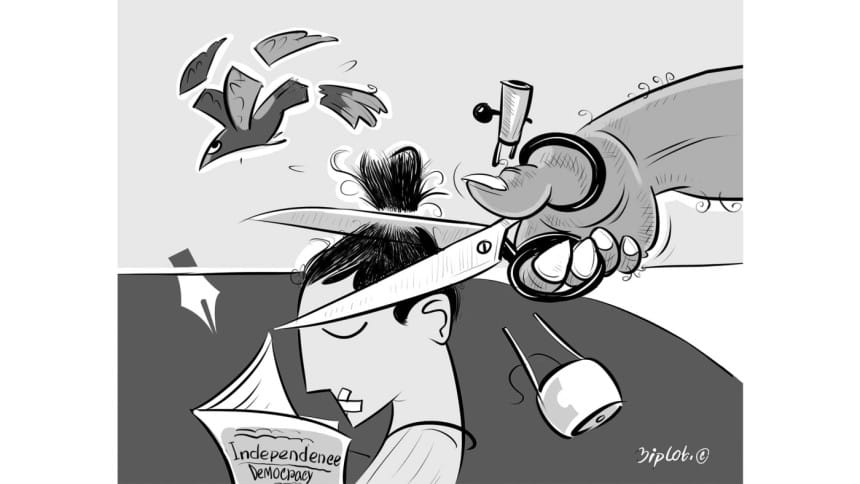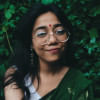It’s more than just a haircut

It's part of human nature to favour symmetry, uniformity, and evenness over something that is uneven or "disorganised." You can see it in how we like to set the volume of our media to even or prime numbers; in how we enjoy the framing of Wes Anderson's films; in how we dress our children for school. It is also natural to want our surroundings to be the way we like them to be, and to have as little disruption or interference from other people as possible.
Any sense of ownership of one's surroundings begins with one's freedom over their body and attire—something that every individual should have. Taking that freedom away is not just a rejection of that ownership—their agency—but also a cruel exertion of "power." This is exactly what happened recently at the Rabindra University, Bangladesh (RUB) in Sirajganj.
The RUB students' outrage against Farhana Yeasmin Baten, head of the university's Department of Cultural Heritage and Bangladesh Studies, who forcefully cut the hair of 14 male students, may seem trivial—or even comical—to some. It's just hair, after all. It grows back. What's the big deal?
Before the university's yearly final exams began on September 26, many students expressed their discontent at the exams being scheduled for seven consecutive days. As a first-year student relayed during a television talk show, the students wanted at least a day's gap between every two exams. According to him, it was "perhaps due to her resentment" over their protest that she instructed students, on September 25, to trim their hair before entering the exam hall. When that instruction was not followed through—as the five-member probe committee formed by the university later saw on CCTV camera footage—the department head cut the students' hair herself in the presence of other teachers and staff members.
By September 29, Baten stepped down from her administrative posts amid the students' protests, including a hunger strike, demanding her termination. In addition, responding to a writ petition filed by Law and Life Foundation, the High Court ordered the RUB vice-chancellor and registrar to submit a report on the actions taken over one month after the incident. The High Court also issued a rule asking five respondents, including Baten, to explain why they should not be ordered to provide a compensation of Tk 20 lakh to each of the 14 victims.
All this, for a bit of haphazardly trimmed hair?
The real issue, of course, is the teacher's complete disregard for the bodily autonomy of young adults.
What the teacher's actions symbolise is that she—and other officials who were present at the scene—don't respect these students as thinking and feeling human beings. Rather, it seems that they view students as somewhat inferior, and thus assume the right to do what they (those in and with power) think is right. So, apparently, the appropriate "punishment" for students who do not want to sit for exams for seven consecutive days is to grab locks off their heads and snip away—hair and dignity alike.
It is not just inside educational institutions that young people are subjected to such arbitrary and dehumanising disciplinary tactics. This often happens as a reaction to how they dress or express themselves—their apparent lack of conformity. The result can be devastating.
Take, for example, the case of 16-year-old Mehedi from Bogura's Shibganj upazila. Mehedi, who likes to sing Baul songs, wear white, and—as per Baul tradition—keep his hair long, was with his friends when they were insulted by locals for their chosen lifestyle. His protest against this treatment led to the enraged taunters entering his house on the night of September 10, beating him up, and shaving his head. They also threatened to throw him out of the village if he continued to sing Baul songs. Three of the perpetrators were later arrested by police after Mehedi filed a case against them.
For Mehedi and also for the RUB students, it's their individuality and right to self-expression—more than their bodily integrity or choice of clothes—that are being attacked here. So prevalent is this policing of the bodies of other people—especially of the young and marginalised groups—in our society that it seems ingrained in every aspect of our culture.
Like many others of my generation, I can also relate to this culture of intrusion into people's private space. By the age of four, I had realised that I was different from my brothers. On the surface, we were given the same privileges. But there were limitations to what I could wear, how I could behave, and where I could go. For instance, the same sleeveless kameez that was fine for me to wear at the age of nine was somehow inappropriate a year later. Eventually, I began to understand that the rules were different for girls in our society, as my brothers were allowed certain privileges that I wasn't entitled to.
While the policing of women's clothing is rooted in patriarchy, other sorts of dominance have come into play in the two aforementioned cases: authoritarian dominance in the case of the RUB students, and religious/cultural dominance in Mehedi's case.
Instances such as these automatically signify to all parties involved: 1) The supremacy of the person(s) wielding power; and 2) The lack of agency and even dignity of the person(s) being subjected to that power. Such abuse of power can only emanate from a heightened, albeit false, sense of superiority (based on age, sex, religion, social class, political clout, etc). The victim is thus always considered inferior.
Telling another person how they should dress, for example, is intrusive enough. But to go through with an action to forcefully alter his or her physical features—even if that does not involve physical pain—is disrespectful, degrading, and utterly deplorable.
What is more worrying is that the whole society seems to be contributing—through their words or actions—to creating a culture of intolerance for diversity and individual choice. We're investing crores into creating imposing physical structures—highways, buildings, flyovers—but what makes a society truly developed is its intrinsic values and moral codes. The idea of a properly developed Bangladesh, therefore, should include safety for all its diverse and marginalised groups. We must strive towards a society where people's individuality is respected and allowed to thrive. This means that no one should be allowed to force their beliefs or principles onto those who are lesser in age, position, or number.
After all, what good can come of forcing people into boxes of uniformity, if all it does is cause them to rebel anyway, or worse, to pass down such policing tendencies onto those younger than them, thus continuing a vicious cycle of hatred, intolerance, and bigotry?
Afia Jahin is a member of the editorial team at The Daily Star.

 For all latest news, follow The Daily Star's Google News channel.
For all latest news, follow The Daily Star's Google News channel. 



Comments